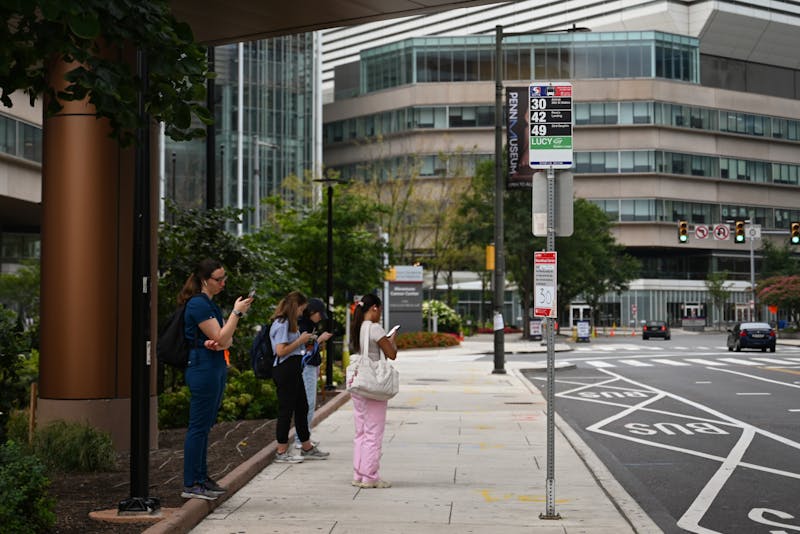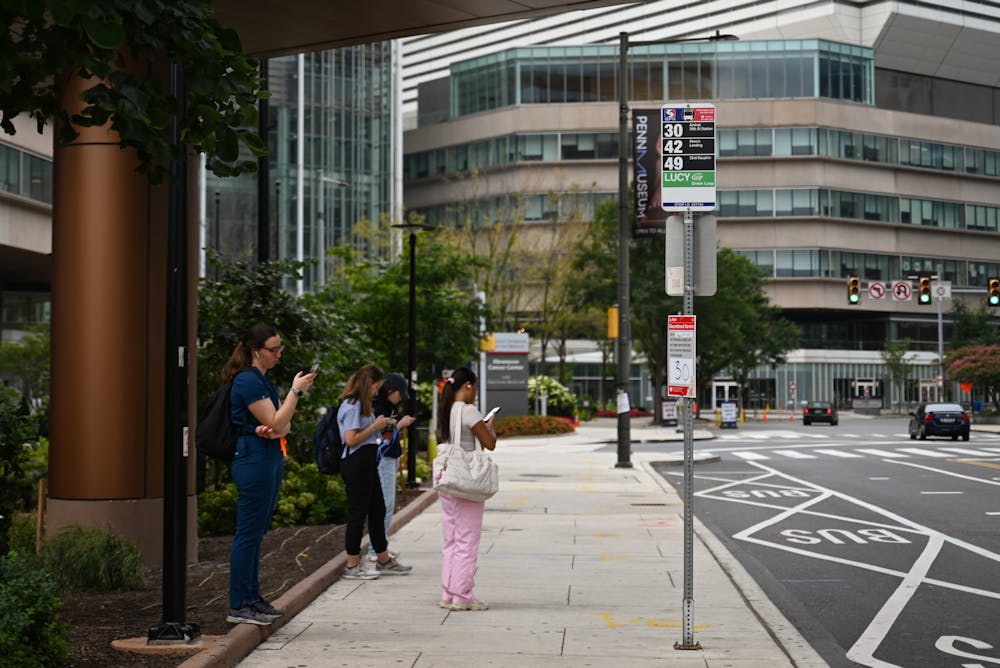Penn Medicine employees wait at the Civic Center Boulevard and Convention Avenue SEPTA bus stop.
Credit: Chenyao Liu
Pending approval from the Pennsylvania Department of Transportation, SEPTA plans to restore service on Sept. 14 by using funds originally intended for capital projects.
SEPTA hopes to receive authorization from Gov. Josh Shapiro’s administration to use capital funds, citing a $213 million budget deficit and a lack of funding from the state legislature as the reasons for the recent service reductions. According to a Sept. 5 letter obtained by The Philadelphia Inquirer, SEPTA General Manager Scott Sauer requested approval from PennDOT Secretary Michael Carroll to use up to nearly $400 million in capital funds to continue operations and avoid service reductions over the next two years.
“It was our hope that the Legislature could come to an agreement and pass into law Governor Shapiro’s plan to increase recurring revenue and find a long-term solution for SEPTA,” the letter read. “Given the legislative delay, and increasing fiscal pressures, we are faced with no other option than to request this waiver.”
Sauer also noted in the letter that, under PennDOT regulations, capital funds may be used for operating purposes to prevent a reduction in service or a fare increase, with the Department’s approval.
“SEPTA is required to continue to provide a level of service that is unsustainable without further operating funds,” the letter read.
Shapiro alongside Democratic leaders have previously stated that they were open to using the capital funding to help fund SEPTA under the conditions that a long-term funding source be established to backfill the account.
Sauer acknowledged that SEPTA is aware that transferring capital funds with no commitment to replace them is not a viable long-term solution.
“These are future capital dollars, which means they will not be available to us to support critical infrastructure rehabilitation and vehicle replacements in the future when they’re needed,” Sauer added.
Regardless of the outcome of its appeals, Sauer said SEPTA will try to return to the pre-cut service schedule as long as PennDOT approves of using capital funds money.
A spokesperson for Shapiro told the Inquirer that his administration is “reviewing this request and determining next steps.”
Pa. Senate President Pro Tempore Kim Ward shared frustration regarding pushing Shapiro to give the funds directly to the transit agencies instead of requiring a legislative solution to help SEPTA.
“We could have done this weeks ago, and actually the governor could have done months ago,” Ward said. “This has been a colossal waste of time and energy — fighting over something we knew could happen and that they agreed could happen.”
Sauer remains hopeful of SEPTA’s restoration plan.
Sign up for our newsletter
Get our newsletter, DP Daybreak, delivered to your inbox every weekday morning.
“The plan right now is to utilize this funding to reinstitute service as quickly as possible,” Sauer said. “We know we can confidently put service back on the 14th.”
The decision to restore service came after a judge ruled last Thursday that SEPTA must restore its services that were cut last month and stop any plans for new cuts. The ruling argued that the cuts implemented by SEPTA put low-income riders and minorities at a disadvantage.
Despite the service restoration, the previously planned 21.5% fare increase will still take effect on Sept. 14, bringing SEPTA’s base price to $2.90 per ride.
The Daily Pennsylvanian is an independent, student-run newspaper. Please consider making a donation to support the coverage that shapes the University. Your generosity ensures a future of strong journalism at Penn.

